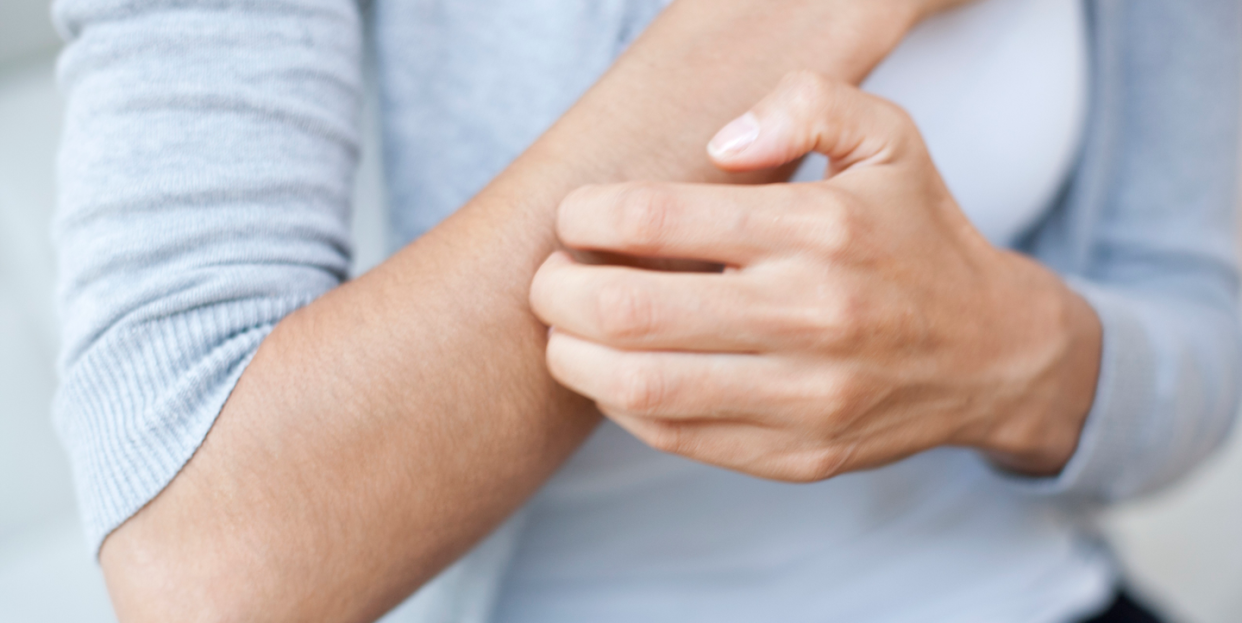Why Do We Itch? The Scientific Causes Are Actually Rooted in Evolution

Whether you’re dealing with dry skin, a mosquito bite, or a full-blown allergic reaction, you’ve likely experienced your fair share of itchiness. But if you’ve ever wondered exactly what causes an itch (which is called pruritus to dermatologists), it can be a really complicated thing, admits Alix J. Charles, MD, a dermatologist and fellow of the American Academy of Dermatology.
While we’re all intimately familiar with what an itch feels like, the sensation is one of the least understood and researched in the dermatology world, per a recent article in Dermatologic Therapy.
Sometimes, discovering what causes itching is easy and obvious (the poison ivy you accidentally touched while gardening). Other times, it’s difficult to figure out what’s causing that must-scratch-now sensation, says Dr. Charles.
Here, we break down why we itch, common causes behind itching, the reason scratching feels so satisfying, and what to do if your itch just won’t go away, with expert insight from dermatologists.
First thing’s first: Why do we itch, anyway?
Put simply, you itch because your skin has receptors called pruriceptors (itch-sensing nerve endings) which get stimulated and, in turn, cause that itchy feeling, explains Melanie Grossman, MD, a board-certified dermatologist based in New York City. As part of the immune response, your body releases substances called histamines, triggering the itch.
There’s a deep-rooted evolutionary advantage to the itch: It’s your body’s way of letting you know ASAP that something (an allergen, a parasite like bed bugs or ticks, or a would-be intruder) is irritating your skin, the protective barrier between you and the outside world. Here are a few more common culprits:
Chemicals or medications
Sometimes, chemicals inside your body can cause itchy skin, says Dr. Grossman. For example, medications like opioids come with the common side effect of itchy skin (possibly because of shared pain-itch neurons), and illnesses like kidney and liver disease can cause itchiness due to a build-up of toxins.
Psychogenic itch
This comes from the release of the chemicals serotonin and norepinephrine, which can accompany anxiety, depression, and stress. “If you’re going through a period of stress like a death in the family or divorce, we will sometimes see people itching for that reason,” explains Dr. Charles. Heat can make you itchy, too.
Neuropathic itch
This rare cause of itching occurs when there’s really nothing wrong with the skin at all, but the brain itself perceives itching somewhere, explains Dr. Charles. It happens when there’s been damage to your nervous system (think: shingles, stroke, or even a burn injury).
Dry, irritated skin
Dry skin in need of some quality moisturizing can make you itch, says Dr. Charles. Skin conditions like eczema and psoriasis can also cause your skin to itch.
Why does scratching an itch feel so darn satisfying?
Essentially, scratching an itch feels good because it distracts you from the initial irritation with a new feeling. “When you scratch an itch, you’re actually creating a different sensation, which, depending on how hard you scratch it, could be severe or minimal pain,” Dr. Grossman says. For a short period of time, this can also provide relief.
Of course, sometimes when you scratch an itch, you only exacerbate the need to itch due to the inflammation from scratching and the potential of creating new wounds on your skin. With more inflammation comes more itching.
What if my itch won’t go away?
“The best treatment for itching is getting rid of the cause,” says Dr. Grossman. After all: It’s better to know what causes an itch—whether it’s your laundry detergent or dry skin—than simply scratching at its surface. Here, a few go-to home remedies and over-the-counter solutions for some of the most common itch triggers from the pros:
For dry skin: Avoid over-soaping itch-prone areas like your legs and lather up with a gentle moisturizing lotion, like this one from CeraVe.
For bug bites and other localized itching: Get rid of the source (as in, treat your dog for fleas or ditch your new detergent) and then try OTC solutions like 1 percent hydrocortisone anti-itch cream or calamine lotion for spot treatment.
For hives and allergy-induced itching: Take an OTC antihistamine like Benadryl. If that doesn’t work, head for the dermatologist, says Dr. Charles.
For stress-induced itching: If you think your mental health could be at the root of your relentless itch, head to your doc for a proper ID. Along with stress management, medications for anxiety and depression could help relieve your itching.
For the mystery itch: If you’ve tried to address what’s causing your itch (or you just can’t figure it out), don’t tackle your itch alone. Call your doctor or dermatologist for help, says Dr. Charles.
Stay updated on the latest science-backed health, fitness, and nutrition news by signing up for the Prevention.com newsletter here. For added fun, follow us on Instagram.
You Might Also Like

